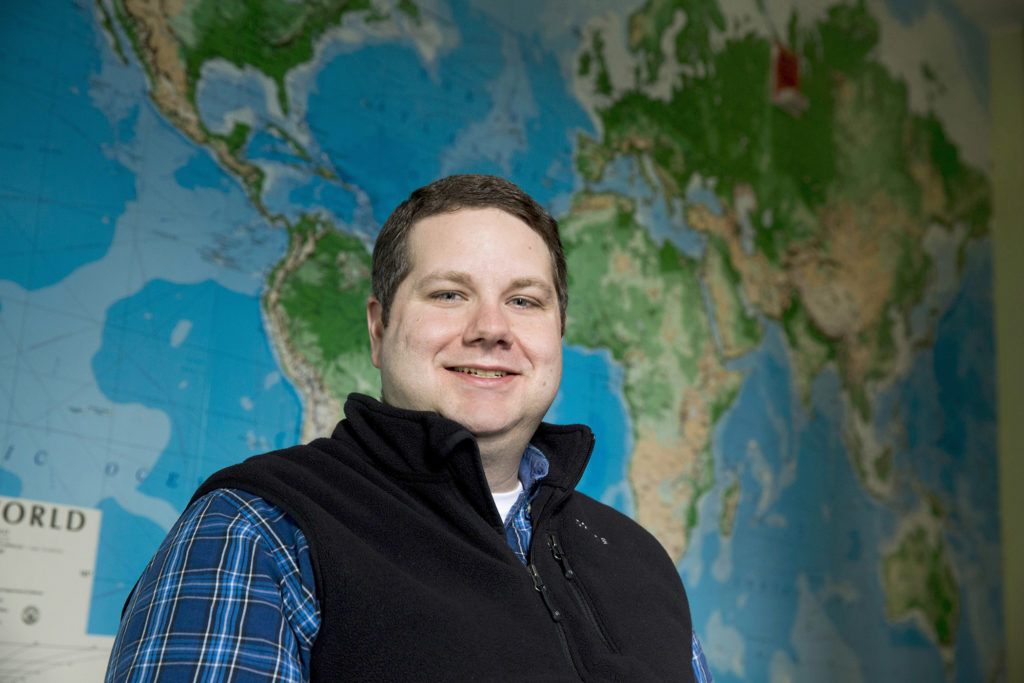FACTS
Matt Clary
Grants Coordinator II
- SPIA and Grady College
- Ph.D., Political Science and International Affairs, UGA, 2014
- M.A., Political Science, UGA, 2009
- B.A., Political Science, Furman University, 2006
- At UGA: 17 months
Matt Clary was a senior in high school in 2001. He’d just finished debate camp and was entering his second year as a debater. The topic for the fall was policies that prevent the spread of weapons of mass destruction. He had his arguments all ready and solidified when Sept. 11 changed everything.
Not only did the terrorist attack change his debate tactics, but that day was when he “realized the world was bigger than I imagined it to be.
“Everything I knew had to be readjusted,” said Clary, a grants coordinator II.
Clary’s revelations led to him instantly knowing what he wanted to major in—political science—when he reached Furman University the next year. After Furman and an internship in Washington, D.C., he came to UGA to study international affairs, something that had become his life’s passion.
A few years later he was receiving his doctorate and then being hired to the position he’s in now.
“In the social sciences, this position didn’t exist,” he said. “And even when I came on, it started out as a part-time gig.”
Clary’s ability to identify grant funding and the faculty of the School of Public and International Affairs’ desire for someone to help with that process, led to the position becoming full time.
Now in his role, Clary works to facilitate the grants process for SPIA faculty as well as those in the Grady College of Journalism and Mass Communication. In between preparing grant proposals, Clary is constantly looking for new ways to bring in external resources to the schools. He’s also helping make the process easier for faculty members.
“Faculty are going to work on grants whether there’s someone to help them or not,” he said. “But it’s better for someone to be here because it helps to streamline the process and understand the agencies and regulations.”
The grant proposals Clary works on vary in both size and scope. Some funding, as much as hundreds of thousands of dollars, can be obtained with a two-page letter. Other proposals require upward of 100 pages and a month of work.
The largest proposal Clary’s worked on was for $24 million in funding to set up a “CNN-type media network” in Turkey to provide news and information to Syrians. Clary and others on the team only had a month to work on the 90-page proposal that covered everything from budgeting to cybersecurity and personnel safety.
Clary said he enjoys his job because it allows him to be a part of the projects faculty members are working on.
“I’m not helping them conduct the research, but I am helping them secure funding,” he said. “I learn a lot about their projects and feel very invested.”
The hardest part about working with grants is staying flexible and detail-oriented, Clary said.
“Every grant is different, and every faculty member is different; I’ve never replicated anything,” he said. “And it’s challenging because if you don’t cross your t’s and dot your i’s, then the proposal will get rejected or you’ll have to wait to get funded.”
In his first year in the role, Clary helped create policies and procedures as well as facilitated the submission of over 30 grant proposals. This year, he’s on track to double that number.
“I feel very attached to this work. I am genuinely trying to help,” Clary said. “The reality is there’s going to be less and less funds available to do what we want to in the future, so we have to find those external sources.”
